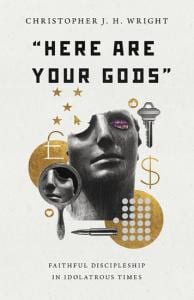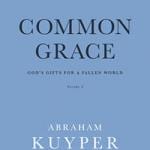We live in an age that has built an idol out of politics. You don’t need to be a Political Scientist to see this fact. We divide ourselves into political factions and then demonize the other side, forgetting that the point of division is not the line of truth established by the Gospel but is instead a line between two parties entirely entrenched in the fallen and temporary concerns of the state. This division becomes more important to us than any other concerns, to the point where we feel more united to those on our side of the political line than to those who confess the same faith. In his new book Here are your gods, Christopher Wright has called us out on our idolatry, and shows us the Biblical path to repentance.

And speaking of idolatry: here’s the requisite disclaimer about how ‘idolatry’ is being used in a sort-of second definition here. The first definition is of course bowing down to statues, incorporating images into worship, and all the other ways in which physical creation is identified with God. That said, unlike many other sins I don’t have an easy term to apply here. “I’m making an idol out of food” is just another way to talk about gluttony, but I’m not aware of a similar word related to politics. As will be clear in a second, this is a distinction that Wright, as an Old Testament Scholar, is clearly aware of, and is not intended to be a criticism. Just a disclaimer, and one which is now ended.
Here are your gods is broken up into three parts. The first and longest walks through an (mostly) Old Testament-based theology of idolatry. Wright begins with the question of the reality of the false gods–is there anything to those statues or not? He then covers the the differences between the false gods and their idols and the true God, and concludes with the proper response of God’s people to those false gods. This response is somewhat determined by setting, but it includes at least 1) remember that God will ultimately win the victory; 2) properly defining idolatry; 3) challenging the idolatry of unbelievers evangelistically and of believers pastorally; 4) warning of the dangers of idolatry prophetically. The main thing Wright leaves out of this section is another properly Biblical response: smashing idols. There are times when idols should not just be defined, challenged, and warned about. There are times when they should be taken out on the lawn and set upon with sledgehammers. We might (and probably will) disagree about what those times are, but if we’ve read the Old Testament we can hardly deny that such times exist. And while this point would have undermined the tone of the rest of the book, it doesn’t negate the fact that it is a Scriptural response to idolatry.
In the second part of Here are your gods, Wright provides a brief Biblical theology of politics. Specifically he outlines the rise and fall of nations and the place of Scriptural moral principles in that historical rhythm. I’ll have to think more about these short chapters. I have the feeling that something is off-kilter here not in the sense that it’s bad or that Wright is teaching heresy or anything like that. God is sovereign over the nations and Scriptural morality does apply (so far, so good). But from our perspective we can’t always see how those two things connect to each other. Immoral nations (that is to say, all of them) rise and fall and there seems to be no connection to their goodness or evil from our non-Divine perspective. Anyway, I want to chew on these chapters a bit more–and obviously I’ve enjoyed reading them, so I’m not arguing that you should skip them or anything like that.
In the third part of the book Wrights gives guidance on how God’s people are to live in a fallen world–especially during ‘turbulent times.’ Specifically, as we are increasingly shaped by the Gospel, we should increasingly be people who 1) build the church; 2) serve society; and 3) steward creation. We might disagree as believers on the best way to pursue those ends (I’m reasonably certainly that Wright and I disagree on the best way to pursue 2) and 3)), but these are clearly Biblical mandates and Wright has done an excellent job of articulating them in contemporary society.
To that end, I cheerfully encourage you to pick this book and begin the process of setting aside your political ‘gods.’
Dr. Coyle Neal is co-host of the City of Man Podcast and an Associate Professor of Political Science at Southwest Baptist University in Bolivar, MO












